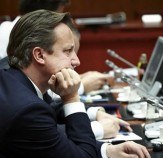(BRUSSELS) – EU leaders meet on the future of Europe Tuesday and Wednesday, following the shock result of last week’s British referendum on EU membership.
In the UK, the seismic fallout from the referendum continues, with the pound and shares falling despite Chancellor George Osborne’s attempts to calm the market turmoil.
The opposition Labour Party is at risk of breaking up following the resignation of more than half the members of the shadow cabinet.
Leaders are warning that racist abuse in the UK is already on the rise following the referendum. Newly-elected Mayor of London Sadiq Khan has put the police on alert for incidents with racial motivation.
On the wider stage, Germany has made clear that the UK will not be allowed to stall the formal process of leaving the European Union by indulging in informal talks.
While the presidents of the EU institutions have said in a statement that they regret the UK’s decision but respect it: “In a free and democratic process, the British people have expressed their wish to leave the European Union.”
They have urged the UK to give effect to the decision as soon as possible, warning of the uncertainty that any prolonged delay would cause.
The renegotiation the EU agreed with British prime minister David Cameron in February is now officially no longer in effect, and “ceases to exist. There will be no renegotiation,” the statement said.
The EU summit on Tuesday will be mostly devoted to a discussion on the political consequences of the UK referendum.
David Cameron will be given the opportunity to explain the situation in the UK after the vote.
On Wednesday, the 27 heads of state or government will meet informally to discuss the political and practical implications of the referendum results. They will also start a debate on the future of the European Union with 27 Member States.
Other pressing issues have moved down the agenda, including tackling the migratory crisis, deepening of the single market to boost growth and jobs, and enhancing the security of the EU by working more closely with NATO.
The European Parliament has scheduled an emergency session on Tuesday to debate the crisis. During this session, MEPs will vote a resolution analysing the outcome and ways forward. EU Commission President Jean-Claude Juncker and Council representatives will take part.



